New York City, August 26, 2014

★★★ Haze stained the edge of the sky. The two-year-old decided he wanted a sweatshirt, and had to be talked into settling for putting it in his backpack. The air was thicker and more difficult to breathe than it had been for weeks. By any standard other than the blissfully anomalous one of the preceding weeks, though, conditions were still gentle. The subway platform was not quite stifling, but the blast of air from an incoming train felt refreshing. The air conditioning on the crowded 1 was up to the task, by a narrow margin. On the D, condensation dripped and puddled on a seat. Aboveground was nicer than below. The haze submerged the Empire State Building and the Freedom Tower, but at midday, an enormous pile of snow-white cumulus stayed pristine up above it all. Even as the western sky went gray-white, a little freshness lingered. A Japanese maple on a rooftop stood up purple-red against the sky. Heat ripples cast wavy, trembling shadows on the apartment wall as the sun slipped behind the neighboring towers.
A Decade Later, Whither the Metrosexual
by Johannah King-Slutzky
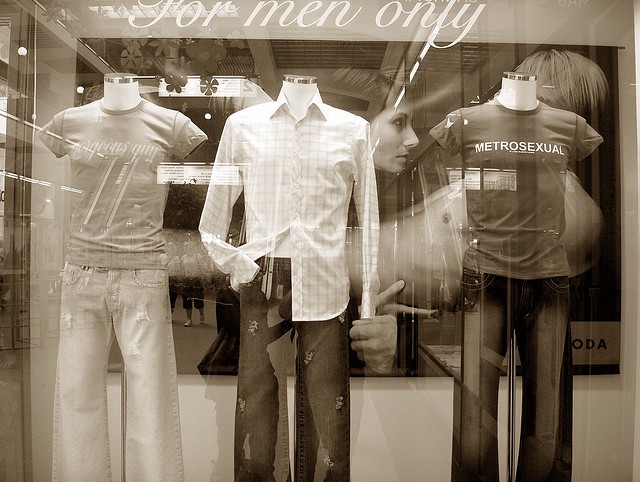
When was the last time you considered the metrosexual? If you are a reasonable person — not this guy — it’s been about ten years. Or at least I thought so, until, after a decade of silence, three people mentioned metrosexuals to me in the same week. Perhaps because it’s the twentieth anniversary of its coining and the tenth(ish) anniversary of Queer Eye.
In reconsidering the metrosexual, we must first distinguish between the metrosexual’s imagined and actual properties. Like hipsterism, metrosexuality is an insult more readily slung than substantiated. According to canon, David Beckham is the ur-metro. Although Beckham initially goes unmentioned in the word’s first printing (in 1994), the word’s progenitor, Mark Simpson, introduced American readers to metrosexuality through the British football star in 2002, when he called Beckham a “screaming, shrieking, flaming, freaking metrosexual…famous for wearing sarongs and pink nail polish and panties…and posing naked and oiled up on the cover of Esquire.” Other icons of metrosexuality of the time included Mark Wahlberg and P. Diddy. This was somewhat shocking to me, since I associate metrosexuality with men who resemble heterosexual twinks — your Zac Efrons, your Ryan Seacrests. Hair that swoops, cheeks that apple.
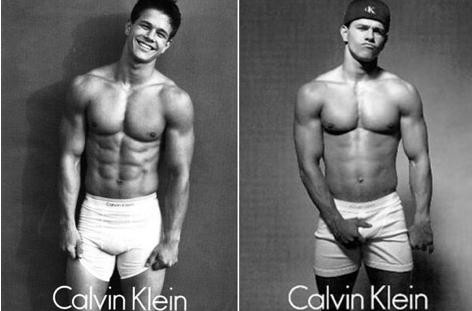
From Mark Simpson’s first article on the metrosexual.
Unlike homosexuality, metrosexuality, one would think, is determined exclusively by artifice. But when I asked friends to delineate that artifice by describing “metrosexual fashion,” there was no consensus (rings? v-neck tees? scarves?). There are also no obvious metrosexual products, and certainly no defining brands — like Sperry Top-Siders are to preppies or Herschel is to hipsters.
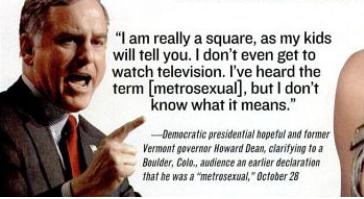
From
The Advocate, December 2003. Metrosexuality was omnipresent, but vague.
Rather, it seems, metrosexuality is attitudinal and behaviorist: It isn’t about using a certain pair of tweezers, but by using them often. On Urban Dictionary, you just might be metrosexual if “you own 20 pairs of shoes, half a dozen pairs of sunglasses, just as many watches and you carry a man-purse.” Attitudinally, we might ascribe it to what Simpson calls “narcissism” and what I would call, in heavy scare quotes, “indulgence.” This is why it is so outrageously easy to lob metrosexuality at even the muscle-ogre-iest of targets; in 2003, Howard Dean was a metrosexual.
Indulgence is at the crux of metrosexuality’s demise. This is not new. Victorianist scholar James Eli Adams argues that Victorian masculinity was characterized by intense programs of self-discipline, and dandyism is conventionally masculine because its lacquers demand self-discipline to curate and maintain. Dandyism, hipsterism and metrosexuality all toe this line by demanding a disciplined commitmentto narcissism and indulgence. Dandys must starch their linens and tie their cravats; hipsters must update their glasses and curate their records; and metrosexuals like Beckham must sculpt and oil their muscles. The masculine transgression isn’t the behavior, which is not actually strange, but the intent — usually self-love, the desire for desire, or (perhaps this is most shocking of all) self-care camaraderie between men and women. To this end, Mark Simpson repeatedly stresses the soccer player’s body as a kind of misappropriation:
“Becks” is…as famous for posing naked and oiled up on the cover of Esquire, as he is for his impressive ball skills….In the interview with the Brit gay mag Attitude, this married father of two confirmed that he’s straight, but as he admits, he’s quite happy to be a gay icon; he likes to be admired, he says, and doesn’t care whether the admiring is done by women or by men.
Beckham wants to turn his muscles into art objects instead of war (or soccer) machinery. He builds a masculine body but appropriates it cosmetically. He’s happy to be gazed at by men alongside women. And while the gay male gaze is not new, what made Beckham unusual was his mentality — he was happy to use his body “inappropriately.”
Because metrosexuality is defined by the intentional misuse of masculine bodies, metrosexuals simply disappeared once their behavior and attitudes cease to be targeted as indulgent. For metrosexuality to die out, its few concrete practices needed only to become familiar — and since most of metrosexuality’s few material practices were consumerist, they were easily made ordinary. So of course metrosexuality died quickly. It was born with a congenital defect.

One of metrosexuality’s functions was to safely excise gay panic. Metrosexuality, like the bromance (another metrosexuality-killer), is extended clickbait for “no homo.” For example, a discursive analysis of YouTube makeup tutorials by and for men identified permutations of “I’m metro, not gay!” as a common defense in YouTube videos and video comments. Commenters made their heterosexuality explicit (for example, “Hey bro…my girlfriend loves having a guy who can look flawless”) or else insisted on their masculinity, as when one explained that highlighting his cheekbones for contouring gave him “a more masculine look.” Relatedly, men’s YouTube makeup tutorials tend to use technical language like “everyday protection” and “fragrance free” and employ authoritative rhetorical devices like identifying perceived flaws (“acne, scarring, redness”) in sets of three.
Metrosexuality equivocates: conservative epithalamium? Or liberator of men? Episodes of Queer Eye for the Straight Guy played this trope straight (ha) by sometimes cleaning up their charge expressly to ready him for a proposal. In queer theorist Jeremy Kaye’s words:
What is significant about [Queer Eye] is that perpetually ‘‘single’’ gay men are supporting the institution of marriage, an institution which they are legally excluded from participating in. So integral for the straight man’s make over, the Fab 5 are now relegated to the sidelines. They are only able to watch and ridicule as what feminist and queer theorists in academe call the ‘‘heterosexual matrix’’ reasserts its hegemony.
Trend pieces that interviewed women for their views on metrosexuality underscore this problem. Judging by the press, metrosexuality only attracts or repels. Although he is supposedly “killing sexuality,” the metrosexual lubricates conversation about heterosexual attraction. When questioned, women chose between only two responses: yes, I like metrosexuality because I want my man to smell/dress/look good; or no, I hate metrosexuality because I prefer a “manly man.” An astonishing amount of press-coverage asked women to weigh in on this question, provoking diatribes like this:
I certainly can’t speak for all women; but among my group of girlfriends, he’s known as the icky dude who’s in touch with his feminine side. In college, he was the Euro guy. He likes to spend $40-and-up on Kiehl’s facial cream, use my loofah, get a pedicure and make creme brulee. He likes shopping and beauty products, but — get this — he still wants to date me and my friends! That’s it. I’m destined to live a life of loneliness and solitude.
>

Jet, Feb 2004
Ironically, metrosexuality chiefly fascinates women. According to Nielsen figures, fifty-six percent of Queer Eye’s viewers in October 2003 were women eighteen to forty-nine. Perhaps some of them, imagining their own makeovers, identified with the Fab 5’s ward? Or else, quoting again from Kaye, “the true intention behind this makeover is always that the straight guy’s girlfriend or wife will be happier.”
The last ten years have witnessed enormous changes in popular attitudes toward gay men, making that kind of “no homo” containment less urgent. Metrosexuality sounds like homophobia’s vespers. Relatedly, implicitly anti-gay metro trend pieces easily became exercises in gender differentiation. In 2004, “He’s on my turf” was a common female refrain in the metrosexual trend piece. For example:
The metrosexual, no doubt, can rival any woman with his skin and hair obsessions…First though, let us continue with the men: Irritable Men Syndrome (IMS): ‘Anger and irratableness caused by a sudden drop in testosterone levels, particularly when caused by stress.’ Are they kidding? Women have had a stronghold on PMS for centuries. Now we have to share our irrational behavior with men?
Metrosexuality, in other words, also expressed discomfort with changing gender roles. Today, that need is met by handwringing of the “can women have it all?” variety: Famously, the object of “The End of Men” is women, but ten years ago, the same headline might’ve topped a trend piece on men who buy fancy soaps.

What was narcissistic yesterday might be just another selfie today, but there are material links between dandyism, metrosexuality, and the more recently-deceased hipster. A genre known as the “male conduct book,” a nineteenth century how-to guide for insecure young men in search of purpler plumes, both substantiates the metro-hipster link and underscores metrosexuality’s conservativism.
The prototype male conduct book may have been Under Two Flags, a now-forgotten bestseller of the late eighteen sixties, originally written as military periodical. Its protagonist, a soldier named Bertie, was heavily coded as a dandy. He has a “dandy’s lamentations and epicurean diatribes”; his sidekick, Mr. Rake, is a pun on the slang for sodomite, and Bertie’s own nickname is “Beau Lion.” “Beau Lion” is impressive enough to modern ears; what you probably won’t detect is that both “Beau” and “Lion” were popular nineteenth-century names for dandies. Among Bertie’s glamorous possessions you’ll find “Bohemian glass, gold-stoppered bottles, perfumes of Araby, a silver dressing-case, brushes, boot-jacks, boot-trees, whip-stands, tiger-skins, a retriever, a blue greyhound, [and] crossed swords.” And this was a bestseller among male soldiers!
Over a century later, the male conduct book resurfaced to channel masculine angst in the early aughts with titles like The Metrosexual Guide to Style: A Handbook for the Modern Man (2003) and, of course, Queer Eye for the Straight Guy itself, which, if you’re particular about your conduct “book”definitions, also comes in paper form as Queer Eye for the Straight Guy: The Fab 5’s Guide to Looking Better, Cooking Better, Dressing Better, Behaving Better, and Living Better (2004). The hipster equivalents are The Hipster Handbook (2003), Vice’s “Do’s & Don’ts,” and Hipster Runoff. Like Victorianism’s masculine asceticism, The TV Queer Eye highlighted (and ironized) male discipline with a segment called “Boot Camp.”
But metrosexuality, hipsterism and dandyism are fascicles, not transposed equivalents. My answer to “whither the metrosexual” is only partially “the hipster.” Key elements of the metrosexual are missing: for instance, hipsters can be women, which dandies and metrosexuals cannot. Metrosexuality and hipsterism share conspicuous consumption; both have been charged as narcissistic, but their narrative conventions diverge. Metrosexuality’s buzzword status reflects the early aughts’ fomenting of gender anxiety into trend pieces, but hipsterism is probably more anxious about labor and nostalgia. (On labor, nostalgia and hipsterism, c.f. vintage fashion, artisanal shit, the working class.) Hipsterism has no marriage plot, and metros might take their coffee poured-over, but they won’t drink it from a jam jar.

What could be more indulgent than drinking hot chocolate in full fleece and boxy glasses while the nanny state pays your medical bills? For this, pajama boy was called “a metrosexual hipster” — the missing hipster-metrosexual link.
Likewise, the “gentlebro” (a trope-name of my own devising) re-branded many of metrosexuality’s grooming practices with more traditionally masculine images. “Men’s products” such as Dove’s “Men+Care” line of face wash, body bars, and hair shampoos transformed and destroyed metrosexuality by urging men to lather up in a masculine way. The subtext is not very sub. One of Dove’s Men+Care ads depicts Villanova’s square-jawed basketball coach selecting between a blurry Old Spice bottle and Dove shampoo. “How important are decision-making skills in your profession?” asks the interviewer. “As a decision-maker, which [soap] would you choose?”
In a sense, the men’s care industry killed metrosexuality by co-opting metrosexuals’ grooming habits and repackaging them as masculine and paternal. Same goes for the renaissance of old-school men’s shops, where conditioning skin and softening hair is neither “metro” nor “narcissistic,” but “classic,” and “quality.”
Still going strong, the gentlebro of men’s care developed serious pop culture clout in 2008 with the advent of Don Draper suave and R&B chivalry, which ironically stretch men’s comfort zones by appealing to conservative, Sinatra-era imagery, such as men in fitted pinstripes and felt hats.
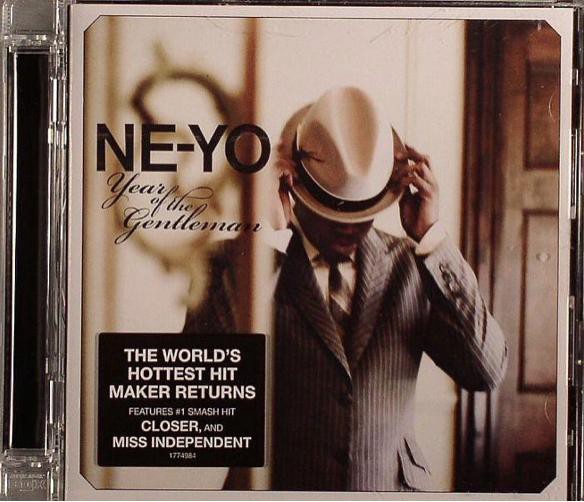
2008, Year of the Gentleman
Feminist scholar Heidi Hartmann defines patriarchy as “Relations between men, which have a material base, and which, though hierarchical, establish…solidarity among men that enable them to dominate women.” One would be remiss to go without noting that the world’s biggest cosmetics companies include L’Oreal, Estée Lauder, Proctor & Gamble, and Johnson & Johnson, all of whom have male CEOs. So, while I may be oversimplifying, it seems plausible that the growth of a men’s care industry primarily benefits men. In this light, metrosexuality ticks off most if not all the boxes for patriarchy. It is a way for men to relate to each other; it has a material base; the industries it supports are hierarchical and at the top exclude women; and it generates solidarity between men.

If you denude “metrosexuality” of its label, little has changed for men since 2004; metrosexuality’s constituent parts have simply fractured into other identities and anxiety-loads. The hipster, the bromance, even R&B’s and Mad Men’s resurgent interest in gentlemanly suave are all redoubts against the genderless dys- or u- topia that metrosexual ideologues forewarned. To steal John Herrman’s line, metrosexuality was killed by “whatever combination of factors led to all the bad hats.” The remaining gender anxiety has shifted onto women, who are not ending the metrosexual, but men. And don’t forget the selfie, social media, and the Brooklyn male novelist, which have usurped metrosexuality’s role as patsy in the war against narcissism.
Still, the real fault lies with metrosexuality itself, whose very definition as “men misusing in their bodies” can’t sustain life for more than a couple years before yielding to the sense that so much indulgence is actually just business as usual. Interpret this as good and bad news: there will always be more men.
Johannah King-Slutzky is a blogger and essayist from New York City.
Top photo by François
Ask Polly: A Chilling Cautionary Tale About the Dangers of Getting Involved With Attached People

Dear Polly,
Yesterday, I woke up to an email in my inbox with the subject “Uncontested Divorce Papers.” I need to sign them and send them back to the lawyer, at which point she’ll file them with the courts, and I’ll officially be a divorcée. In order to make the process as quick and hassle-free as possible, the reason given for the divorce is “irretrievable breakdown of marriage over a period of at least six months.” The problem is, as far as I’m concerned, that’s a complete lie.
I’d been married for fourteen months and twenty days when my husband told me he was in love with one of my close friends and that he didn’t want to be married to me anymore. The day before he told me this, he’d sent me flowers at my office. The night before THAT, he’d texted me that he loved me so much. When friends say, “Well, there must have been signs,” I ask if flowers and love poems and dates are signs of irretrievable breakdown of a marriage. Then they stop asking.
I met my husband in graduate school, where we became good friends. Deep down, I knew I had developed feelings for him, but I denied them, because he had a girlfriend. When he moved to New York after graduation, we kept in touch, talking every day for hours on g-chat. When he told me he had feelings for me, as more than a friend, I was ecstatic. He’d been telling me about problems with his girlfriend for a long time, but they were still together. I told him he needed to break up with her and then we needed to take a break before we could start dating. I assuaged my guilt by believing he didn’t love his girlfriend, that she was possessive and boring. I never asked more questions because I was too happy.
We dated long distance for a year, seeing one another almost every weekend, until I moved to New York to be with him. We adopted a dog and got engaged. After eighteen months of planning together, our wedding was by far the happiest day of my life. Though I’d felt isolated when I first arrived in New York, I eventually made friends of my own at my job (one of whom became the woman who is now my husband’s girlfriend), and got closer with his friends. I loved our life together.
One thing I knew about my husband, though, was that the same boundless ambition and creativity that made me love him was also a destructive force in his life. Nothing he did was ever good enough. My real fear was that nothing I did was ever going to be good enough either, but he assured me this was not the case. It turns out that I was right. Though he gave me no sign that he was unhappy with our relationship, I’d somehow missed the mark.
It’s been three months since he told me he didn’t want to be with me anymore, and since then, we’ve had very little contact. Every time I’ve tried to reach out for answers or to express any emotion, he hasn’t responded. When I asked him why he never gave me a chance, he responded that our “marriage was my chance,” though he’d never expressed his unhappiness to give me a chance to try and make things better.
I’ve moved back to where I lived before I moved to New York and I’m doing my best to move forward. I’m seeing a therapist. I’m keeping busy. I’m doing yoga and talking to friends and taking care of myself. We had many mutual friends, many of whom are still his friends, which is another difficult situation.
My question to you, Polly, is how do I continue to move forward when it feels like I’ve failed at my marriage, my love, the life I loved? Though rationally, I know it was his actions that destroyed our relationship, it’s still difficult to keep from feeling like I messed up somewhere along the way and that no one will ever love me again. I’m torn between anger toward him (and her) and devastation for the huge loss I feel.
And I don’t know what’s better — that sadness, or the anger? The anger feels better than the sadness but I don’t want to become bitter. Is there a middle ground?
Looking for Balance
Dear LFB,
I know this is going to sound harsh, but bear with me, because it’s necessary: You did mess up somewhere along the way. You engaged in an ongoing flirtation with a guy who not only had a girlfriend, but had the bad taste to complain about his girlfriend to you, his attractive female friend. And what were his complaints about his girlfriend? That she was possessive, and boring.
Attention, Every Single Human Reading This: If you’re flirting with someone who’s currently attached, and they start to badmouth their partner? That is a giant red flag. Even if the partner in question is verifiably not so great, it’s fucking weird for a person to hang out and whine to attractive others, rather than simply, say, dumping said malignant partner and THEN bagging on his/her irredeemable ass with vim and vigor (and with other dickish friends with weird lowercase names).
Once you dump your lame girlfriend or boyfriend, you can feel quite free to bag away. But while you’re still attached and/or living with your partner? Bitching and moaning to potential sexytime partners is really poor form. And, if a sexy human you want to sex tells you that their partner is BORING? And possessive? AND THAT’S ALL THEY CAN COME UP WITH? Run away screaming. People who fuck people then tell other people they want to fuck that the people they’re currently fucking are super fucking dull? These are bad people.
These are people who just don’t like other people. “Jesus, my girlfriend, I swear she breathes in oxygen and breathes out carbon dioxide sometimes,” they might as well say. Because when you go to bed with someone and wake up and eat together and go to bed together again and wake up? See, I’m already bored by both of you just writing it down. People get boring. An inescapable fact. PEOPLE. GET. BORING. People of all stripes, from all walks of life, get boring. Boring is not a reason for anything. You say someone you’re fucking is boring? The first thing I think is sweet god in heaven YOU my friend are BORING. Stop taking it out on everyone else.
Better yet is POSSESSIVE, as in “My girlfriend, she just gets really possessive, it’s a total drag.” Gee, that sucks, why does your miserable insecure shrew of a woman have to get all possessive and shit, when she has a guy who’s sweet and honest and opens up within minutes about what a jealous little bitch HEY WAIT A MINUTE.
I know you didn’t come here for me to bag on you, LFB. I just needed to address the fact that you presented us all with a chilling cautionary tale about the dangers of getting involved with involved people. You’re doing many readers a major service just by telling your story, and I mean that in all sincerity.
Those who’ve read through a lot of the Ask Polly archives may have already noticed that many of the people facing the most hideous and unkind breakups are also the people who were informed by these partners very early on in the relationship that their previous relationships ended when they very suddenly “got bored” with their exes. Or who told them that their exes were totally “boring” and/or “the jealous kind.” So. This is a teachable fucking moment.
I just want to add that if you’re g-chatting with a guy who already has a girlfriend for hours at a time, that guy is an escapist. He’s looking for a fix. There’s a fifty percent chance he’s using you for a fix without any intention of breaking up with his girlfriend. And there’s a fifty percent chance he’s setting you up to be a stepping stone out of his current relationship. People in the market for stepping stones typically never leave the market for stepping stones, even after they marry you. They are always on the lookout for an upgrade, no matter what their current circumstances might be. The speed with which they dump you depends entirely on the quality of goods available for perusal while you’re together. Saying “You have to break up with her, then be alone for a while, before we can date,” and then g-chatting him through the whole process, shouldn’t assuage your guilt, because you’re making it clear that you’re waiting in the wings. Plus, he still has his fix.
And keep in mind: It’s all arbitrary, with these bored possessors of the bored and the possessive. Like anxious window shoppers at the mall, they are the most bored and the most possessive of all, twitchily looking for something to possess, something that might render them less dissatisfied, less bored. And like a reverse Midas touch, they instantly render all that they possess bored and possessive. Because they are haunting humans to spend time with. They pretend that they’re accepting and loving while inside they’re tearing their hair out with boredom. Their demand for companionship dictates that they must play at SEEMING wonderful (Flowers! Adoration!) even as they lay out the next escape route.
So look. Getting dumped by this conspicuous consumer, this deeply afraid and deeply repugnant fuck, it’s a beautiful gift. Your ex-friend and coworker is the one who should feel cursed, not you. This guy was a mirage from the very beginning. He was a ghost.
That doesn’t change how you feel right now. Right now you’re devastated. I’m really sorry that you had to go through this. You feel like you failed at your marriage. But look: You didn’t have a marriage. A marriage is two people, working together, telling each other what they need, meeting somewhere in the middle. What you had was someone who pretended, who didn’t tell you what he needed. He says “You had your chance. Our marriage was your chance.” But he didn’t show up, didn’t let you know what was going on with him. Hell, he won’t even debrief you NOW. Not because he simply refuses to tell you what happened, but because HE HAS NO FUCKING CLUE WHAT HAPPENED. He might as well be a life-sized cardboard cut-out. You might as well have dragged a cardboard cut-out down the aisle.
The fact that you’re tempted, for even half a second, to view this experience as a personal failing of yours, an indication that no one will ever love you again, is a testament to the poisonous messages women marinate in during their formative years. It’s like you were attacked by a shark, and now you’re blaming yourself for being made of meat.
So that’s the (somewhat contradictory!) message I have for you: You DID fuck up by getting involved with this cardboard cut-out, this emotional vampire, this conspicuous consumer, this blatantly unjust two-timing weasel. I don’t usually say this, but I say it for your benefit, for your future path: Your situation is a clear indication that you have bad judgment when it comes to men. But: You DID NOT fuck up by being you. You weren’t eminently rejectable and repugnant in those 14 months you were married. You were just a fucking person, and this guy doesn’t want a person, he wants the flicker of promise given off by that woman over there, or that one, or that one, or that one. They all seem so EXCITING by comparison to real people.
I’m being brutally honest with you for a reason. Moving on is going to be very difficult if you’re confused about what you’re moving on from, and you’re confused about your culpability. And YOU are confused for a reason. Because you fell into something and ignored all the red flags and rationalized away your own bad behavior and gave the guy lots of empty hoops to jump through to make yourself feel better. You have to look at that stuff, not because you are BAD and you were the first woman in the world to do these things. Almost every woman alive does ALL OF THESE THINGS at one point or another. (Ideally in high school. SORRY KIDS! HIGH SCHOOL IS HARD, I KNOW.) You have to look at this stuff because you need to be in touch with reality.
Did you hear that? You need to be in touch with reality.
Here is reality: You made some big mistakes. But here’s the other side of reality: You are a good person. You are not boring. You are kind and supportive and fun. You are not someone who was destined to get ruthlessly dumped by her first husband. You are not summed up by HIS lazy, unfair, unexplained actions.
Reality will be hard for you, because part of it is harsh: You fucked up. You did. You have to keep in mind, everyone fucks up. You just had no idea you’d bumped into a predator. Maybe you’d never met one before. Forgive yourself. But look clearly at the facts, so this won’t happen to you again. Don’t allow yourself to get swept away, and don’t let yourself off the hook. Open your eyes wide and look at what happened. Look at how you sweet-talked YOURSELF into this. Look at how you let your fantasy get in the way of rational decisions. This makes you exactly like every human being alive. Have compassion for yourself, even as you’re facing this.
The other side of reality will eventually soothe you: You are still the same appealing, lovable woman you were before this happened. You are no less lovable than you ever were.
Clearly, you need to enlist your therapist’s help in moving away from fantasy, into reality. And once you’re firmly grounded in reality, you need to ask yourself: “What do I want for myself? What do I want from my life? Who do I want to be?”
What circumstances, in the future, might make you feel strong and wise and resistant to empty temptations from predators? What kind of a woman will you be in five years? Will you be the kind of woman who’s g-chatting with some dude with a supposedly boring girlfriend? Will you still be seduced by the promise of a fantasy?
Or will you be happy with who you are, open to love, but realistic and firmly grounded in the here and now? If that sounds boring, then that tells you something. But reality is far sexier and much more romantic than you think. A fantasy can seem shiny and special from a distance, but when you get closer and closer it tends to shrivel up and die. Reality, on the other hand, gets better and better the deeper you go into it. Once you start to see yourself clearly, and admit that you’re not a cardboard cut-out of Fantasy Wife, Eminently Lovable, Worthy of Lifelong Adoration, then you can finally start to breathe.
We are all tempted to be shiny. There are so many shiny women out there. We are taught — and eventually we believe, in our hearts — that shininess is the surest route to love. But aiming for shiny is like living in the dark. “Though he gave me no sign that he was unhappy with our relationship,” you wrote, “I’d somehow missed the mark.” Though he told you nothing, YOU somehow fucked up. Though he was just a mirage, YOU were the sad rejected woman who didn’t please him enough. When you aim for shiny, you become nothing but a reflective surface. At your very best, at your peak shininess, he will only see his own reflection in you.
The most beautiful, loving, poetic souls in the world know that the most beautiful, lovable people in the world are the ones who are a little tarnished, a little scratched. If you want true love in your life, you will stop trying to be a brilliant silver chalice, and you’ll aim to be a misshapen pewter cup instead. Something ordinary, that you can pick up and feel and rub between your hands. Something regular and dented and scratched.
This tragic turn in your life gouged a big scratch across you. Own that scratch, the anger and the sadness there. Tell the truth about what it did to you. Because it was a gift, this premature exit from a fantasy world. It was your passage to a better life, lived among real people with heart and substance, where tarnished things are good enough, where you are good enough. You are good enough. You are good enough, right now. You are good enough. You are.
Polly
Heather Havrilesky (aka Polly Esther) was The Awl’s existential advice columnist. She’s also a regular contributor to The New York Times Magazine, and is the author of the memoir Disaster Preparedness (Riverhead 2011). She blogs here about scratchy pants, personality disorders, and aged cheeses.
Time to face reality: The bad news is, Ask Polly is moving to New York Magazine’s The Cut. The good news is, you can read the very first Ask Polly column for The Cut right nowish.
Photo by Mario Sainz Martínez
How to Count to Infinity
As a child, one might have imagined counting to ten billion in the course of reckoning with the seeming infinitude of enormous numbers. This is actually impossible to do in a human life time, since it would take over three hundred years. But, as an adult, one might discover that he can simply will himself from zero to that number, or even more — at least as long as he is counting in dollars, as the founders of Snapchat and Uber have discovered, whose companies are now valued at more than ten billion dollars. A lingering question: now that the ten-billion-dollar frat has become a little less exclusive, who will be the first to reach infinity?
Jay Prince, "Polaroids"
Jay Prince, the East London rapper, tells The 405: “I don’t know, I mean it wasn’t really much else, there was no big thing that happened behind it — it was just me getting back into the swing of things and just trying something new.” Good enough for me!
TITLE SHOTS : Conor McGregor
by Awl Sponsors
In the video above, Fightland teams up with Sailor Jerry to explore Venice Beach with Irish UFC featherweight Conor McGregor to learn how his obsession with movement has shaped his fighting style.
Title Shots is a series of stylized short films that take viewers inside the minds of professional fighters, providing a one of a kind intimate look of whats going inside their mind rather than what’s going inside the octagon.
New York City, August 25, 2014

★★★★ An orange flash of sunrise came off a building to the west and through a crack in the blinds. The morning was cool still but humid. The uptown train came to a stop with a wash of heat across the platform, raising a sweat. On the ride downtown, a couple carried matching beach chairs. Every line of mortar was distinct in the upper-story brickwork. By midday, up on the roof, the sun was hot. It was pleasant to let it pin the body down in a chair, to feel the black plastic hot but not hot enough to hurt through a shirt. One eye had to stay squinted shut for a while, till acclimation set in. A blue-white haze enfolded an airplane and tinted the Freedom Tower; a blue-white glow flooded the retinas. By rush our the streets were shady and cool again, with a breeze moving through them. Dazzling beams of light came through gaps in the buildings without warning. The sun went down behind a line of bright-rimmed blue clouds, with nacreous ones above.
A Redder Summer
by Emmet Stackelberg
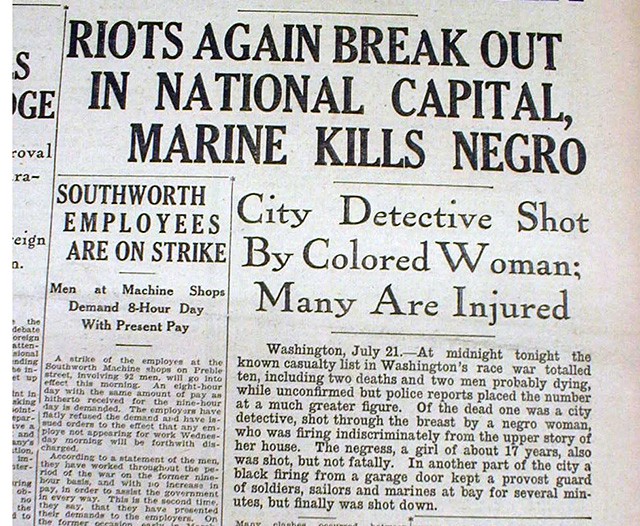
On the third Saturday of July in 1919, a number of military men — some recently discharged, some just off-duty, but many in uniform — began indiscriminately beating black men who happened to be walking in the area of the National Mall in Washington D.C. The attackers sought to avenge a white woman who had been allegedly “jostled” by two black men; she claimed that they tried to steal her umbrella. The Washington Post reported the incident under the headline “Negroes Attack Girl.”
Washington, D.C., faced a particular set of racial tensions that summer. Local newspapers carried reports decrying the racial conflict tearing apart the nation in other cities, all the while publishing sensational stories about a new wave of crime caused by blacks in D.C. The Washington Post published a letter to the editor on July 13th that was concerned about the “crimes and outrages that have recently been committed.” It suggested that, because “many of the suspects are negros” perhaps some “negro ex-soldiers” should be appointed to the police force.
The city certainly had no shortage of ex-soldiers, many of whom had stayed after the end of World War I, but the vast majority of them were white. After the story of the jostled woman broke, a false rumor spread that she was the wife of a retired Navy employee. The soldiers, unoccupied by work in a city with too many bodies and too few jobs, saw this as grounds for a counterattack. The next evening, they planned to assault a man named John Colle, who was believed to be one of the two jostlers. On their way, the soldiers attacked black men at random. The violence continued on Sunday as bands of whites pulled black men off of passing streetcars and began beating them. In one statement to the NAACP, recovered by historian Delia Mellis in her dissertation about the D.C. riots of 1919, “The Monsters We Defy,” a man reported riding the Seventh Street streetcar, “when a mob of sailors and soldiers jumped on the car and pulled me off beatting [sic] me unmercifully from head to foot leaving me in such a condition that I could hardly crawl back home.” He was seventeen years old.
Black men and women in D.C. began fighting back. They formed armed patrols of their own neighborhoods and, in some cases, shot at whites that they felt posed a threat. In one incident, at Seventh and T, black rioters who refused to disperse when ordered by police began firing, while women hanging out of windows threw whatever they could at the police from above. As the violence spilled over into Monday, the city brought in over a thousand federal soldiers in an attempt to restore order. But the military didn’t end the rioting: Torrents of rain swept through the city and helped wash away the chaos. “It may be,” the then-field secretary of the NAACP, James Weldon Johnson, later wrote, “that the rain had something to do with the things that did not happen.” By riot’s end, the mostly white police force in D.C. had arrested far more black men than whites. Often, armed black men defending their neighborhoods were arrested and jailed on weapons charges. When Johnson met with the chief of police and the commissioner after the riots had subsided to request that black “special officers” be appointed to protect blacks from unprovoked attacks by whites, both categorically refused.
After the riots, in the NAACP’s monthly periodical, Crisis, Johnson praised black efforts to fight back. “The Negroes saved themselves and saved Washington,” he wrote, “by their determination not to run, but to fight — fight in defense of their lives and their homes.” Had they not fought, claimed Johnson, “Washington would have been another and worse East St. Louis.” (During that riot-turned-massacre in 1917, at least thirty-nine black men, women, and children died after whole blocks were burned to the ground under the eye of police officers whose mandate it was to protect them.) In the end, Johnson felt that the riots marked “a turning point in the psychology of the whole nation regarding the Negro problem.” He was wrong.
Only days after the wet halted the D.C. riot, the drowning of a seventeen-year-old black teenager at a segregated swimming area in Chicago, and the subsequent arrest of a black man for the crime — whites onshore had pelted him with rocks — set off one of even greater magnitude. It lasted for five days, resulting in twenty-eight deaths and over five hundred injuries. Riots followed in Syracuse, in Philadelphia, and in five other states over the next month. The season of riots ended with one in Elaine, Arkansas, at the beginning of October, in which over a hundred blacks were killed.
Johnson later called that summer the Red Summer, because of the blood that spilled in so many cities — the blood to which Jean Toomer, in the story cycle Cane, directs the question: “Who set you flowing? Flowing down the smooth asphalt of Seventh Street, in shanties, brick office buildings, theaters, drug stores, restaurants, and cabarets? Eddying on the corners?” In Washington D.C., it was in large part uniformed men, most of whom had just returned from war, and, still in their combat uniforms, had brought it back with them.
Emmet von Stackelberg is a writer living in Cambridge.
Photo via
Who Reads 'Mein Kampf'?
by Andrew Heisel

Earlier this year, a new volume of Karl Ove Knausgaard’s novel My Struggle arrived in America, prompting a fresh discussion of why the writer borrowed his book’s title from Adolf Hitler. Knausgaard said the choice was about scaling down; he wanted to contrast the dictator’s “grand, ideological worldview with the reality of the individual.” But he also believes that, “for someone interested in the zone between literature and reality, this book is, in the end, impossible to avoid.” In fact, he added, “I think everybody should read Mein Kampf.” Responding to the surprising spike of digital sales of Mein Kampf, Stephen Marche echoed Knausgaard’s sentiment in Esquire: “Everyone should read it. It’s essential to understanding history and the way that history reaches into our present moment.” And, last month, when considering if Germans should read the book, Peter Ross Range concluded in the Times that they would be “better served by open confrontation with Hitler’s words.”
So, perhaps everyone should read Mein Kampf, as these men have recently determined. But who actually does? What perspective do these bring to the book? What do they buy alongside it? What did these people hope to learn? There are over six hundred reviews of Mein Kampf on Amazon, and I read all of them. Who gave it five stars? Three stars? Or just one?
Of the patterns that emerged as I read Hitler’s readers, none were so immediately unsurprising as readers who do not reckon with Mein Kampf so much as adhere to it, chapter and verse. Consider the following review, titled “Jesus and Hitler”:
Hate them both or Love them both. What’s important is the realization that they came preaching the same message and suffered the same fate.
This type of reader frequently discusses “our servile deference to Jewry” or refers to the author as “Herr Hitler.” They deny the Holocaust. They call the book a “must read for any racially conscious white person.” They sign off, “All the best, to one of the Volk!” But many of this ilk are less overt, suggesting they came to Mein Kampf innocently and found reason there. They imply a process of discovery and conversion, much like Hitler’s. One writes:
Hitler didn’t wake up one day and hate the enemies of Germany. He saw problems with society and devoted his life in Vienna studying history and Marxism and relentlessly questioned the people behind the politics. He learned they were anti-German and transforming Germany/Austria into a multicultural state.
While Knausgaard says he’s confident that nobody will be converted by reading the book, these sympathetic reviewers insist that it’s an eye opener: “I’ve read the entire book twice and i’m only 17. The idea’s and ‘ramblings’ as all you protalitariats call it would actually work. People should just give his book a chance in society today. It would be such a better place.” For Hitler’s converts, the “kosher biased media” is all that divides the enlightened from ordinary “sheeple.” Clarity lies in simply opening the book: “No wonder Europe is in the mess she’s in. No body reads anymore.” For these reviewers, the question tends not to be whether Hitler was right, but which is the right translation.
Other readers look to Mein Kampf for the opposite of instruction. They read to stay vigilant:
We don’t want this in the house. BUT Rush Limbaugh has told us about technique of “The Big Lie” in Mein Kampf. We are Tea Party Conservative Patriots and love the Constitution … We have the need, the duty to KNOW THE ENEMY, so it can NEVER HAPPEN AGAIN
The dangers of liberalism motivate many of these reviewers. Approximately two-thirds of all Amazon reviews of Mein Kampf have been published since Obama took office in 2009. I haven’t found evidence of a recent conservative call to read the book, but right-wing voices have been especially vocal in the reviews since the beginning of the year — right around the time that it was reported that Mein Kampf was an e-reader hit. One story noted that Mein Kampf’s place on the digital sales charts was surrounded by books from various conservative luminaries like Sarah Palin and Ben Carson. Some of the reviewers of this ilk not only insist that “national socialism” is the same as liberalism but also repeatedly assert, as one does, that “if Marx was not born as a Jew, Hitler would have bought into his economic plan.” One conservative is open about Hitler’s position on the extreme Right and annoyed by the intrusions of neo-Nazis into the Tea Party; this gets him branded a liberal.
Clearly, many are taking this “know your enemy” idea seriously. The most common companion purchases to Mein Kampf on Amazon are historical studies, anti-semitic screeds, and the Communist Manifesto, reviews of which have also been tilting more heavily against Obama in the past year. Saul Alinsky’s Rules for Radicals is another frequent companion purchase. (Of the four hundred and seventy reviews of Alinsky’s book, ninety percent have come since 2008, and almost all are by conservatives.) Most of these reviews try to play it coy about their target. It seems that they think the answer to avoiding Godwin’s Law is not to fully enunciate the comparison. Some choice excerpts:
But then again, many are less so:
A number of reviewers bring up the remarkable similarity that both men wrote a book before rising to power. They insist that like Mein Kampf, Obama’s books are filled with “morbid ideas” and tales of a “devious life.” Yet, to some, it’s also a shame Obama’s books aren’t more Kampfy:
If Barack Obama had had the honesty to write what he really believed, instead of the vapid mush he put in his books, he never would have been elected President.
To others, Obama is actually worse. One writer says, “I only bought it to see how closely Obama is following his formula, and I have to say he’s doing a hell of a job.” Another from 2010 has an even closer read on things:
I read this book to see if we are repeating history in any way at all. And YES we are. The one difference is that we now have a leader in America that has accellerated the pace of the Nazi’s. Hitler had his brown shirts where Obama has his purple shirts. Hitler had Gurbles vs Gibbs and Axelrod. Hitler had Himmler vs Rob Emmanuel and Andy Sterns. The parellels can go on and on. But what I found terrifying is that our president is moving at light speed in comparison while following a very simular road map.
Dozens of reviewers use this line about history repeating. This one would surely like to be able to “go on and on” with supposed parallels, but it sure gets tricky. Hitler began killing disloyal elements within a year of taking power. In his fifth year in office, Kristallnacht happened. Surely, not all these conservative reviewers believe what they’re saying. Many of their reviews are the shortest and least detailed, suggesting that perhaps they didn’t read the book and simply see this forum as a useful place to perform their contempt of Obama.
And yet, as much as Hitler is feared by these conservative reviewers, there are also awkward moments of appreciation for him. “Without giving sanction to all his ideas or actions,” one writes, “I could without reservation wish that America had one statesman who loved his country as much as Hitler did.” And some admire more than just his passion. Another says that Hitler “accurately nails the weakness and evil of democracy but then through his live and actions he displays the evil of dictatorship.” This distrust of democracy — as opposed to Republicanism — is a favorite Glenn Beck theme that appears a few times. Apropos of nothing, the Limbaugh listener quoted previously says, “Did you know that Democracy is Unconstitutional? Democracy is Mob Rule and the Founders were dead set against it!” (She’s not entirely wrong.) Although one reviewer finds the book to be the “bedrock” of today’s political correctness, another declares the book “refreshingly PC-free.”
Many of the conservative reviewers thus look to Mein Kampf not just to learn the ways of the enemy but also for practical advice:
Yet conservatives are not alone in finding things to agree with in Hitler’s tome. One reviewer writes, “Taking most of the statements and conclusions from this book and displaying them separately you would be surprised as to how many you would agree with.” Another says, “I will admit I agree with Hitler … but damn its hard to disagree with Hitler when it comes to social and governmental issues.” One describes this feeling as “psychologically torturing.” For some, this feeling is a reason to read the book: Maybe you ought to confront your own capacity to be Hitler.
Maybe, many reviewers suggest, this opportunity is being kept from you. It’s not only Hitler’s ardent admirers who feel this way. Plenty are simply taken with the idea that “The truth always seems to be somewhere in between the poles,” even if one of those poles is Hitler. They read Mein Kampf because both sides must be heard. Balance must be restored:
Even while rejecting Hitler, many reviewers note that “the one-sided story taught us in school” has misled us. We should read Mein Kampf to get past the “slant” of historians and “to obtain balance from the other literature.” There can be no “better source that the central figure in the story himself.” If we don’t get “the complete facts” to “understand both sides,” we’re “no better than any of those critics or movie makers that produce films that slander our country.”
Yet reviewers never point to any facts they’ve discovered that aren’t readily available elsewhere. What they really mean is that we’re never given an opportunity to sympathize with Hitler; these reviews are doubtless written after the reviewer has felt an unexpected kinship with the man, so it feels like something had been hidden. Plenty find themselves thoroughly impressed with his reasoning, albeit with important caveats. They come to believe Hitler “had a good idea,” as one writes, but unfortunately took it “to an extreme in killing other races.” Even if the man was “not quite right in the head,” another says, you “cannot denounce the book because of the author, that would be unfair.”
These reviewers are reasonably skeptical of mainstream forums, which, as the reviewers’ grammar sometimes indicates, rarely include their voices. Like so much bad news coverage, these reviewers start from a laudable goal of seeking differences of opinion and reduce it to a matter of weights and measures. Whereas journalism’s parameters of acceptable opinion are rather narrow, however, these reviewers expand the range of valid opinions all the way to Hitler. The man and his book thus continually earn hollow journalistic epithets like “controversial” and “polarizing,” as though Hitler’s depravity is still up for debate. Speaking in these terms of meta-analysis, that opprobrium is elided; maybe some even slyly use this approach to work Hitler back into the realm of acceptable thought. One reviewer writes that although Hitler did good for Germany, “he did harm to the rest of the people he thought as inferior. On the net of things, the oppinions tilt to more harm than good although some disagree.” (“3 of 4 people think this post adds to the discussion. Do you?”) This is not disinterested, academic inquiry, since no truth is sought; it’s just a purposeful way to shut one’s eyes.
For readers of another bent, the book is valuable not for what it can tell us about evil but about excellence. Such readers glean tips about “organizational brilliance and unrelenting effort, agenda aside.” They’re like nihilists, granting esteem to whoever makes the earth shake:
The book may be boring, but it was the cause of the death of 70+ million people. Big impact.
“Impact” is also why the book has an average rating of four stars. Even those unimpressed with Hitler feel it deserves the stars on account of its renown; those who rate it poorly are sometimes chided in the comments. For many, success, whatever the endeavor, blunts criticism. They come to Mein Kampf in awe:
Again and again, reviewers praise Hitler as “one of the most powerful men in history,” or “the greatest mover in history.” He was a “man of strong principles, discipline and good organizational skills,” and overcame poverty “to create the worlds largest empire.” Try to set aside your negative feelings for a moment and appreciate the impact: “Greatness is not measured by good or evil. Greatness is. Fascist or not, Hitler was a great leader.” The praise is qualified, but the tribute paid to morality often feels trivial alongside the esteem. Hitler “did some bad things,” one of the above says. Although he “crossed that line and spiraled into madness” and “evil,” says another, he was “wonderful leader.” Few leaders, offers another, have “matched the depth of his dedication, evil though it was.” They see that he’s a “monster” just like many of the other reviewers; they just don’t think it’s worth dwelling on instead of the positive takeaways.
Some would suggest this discourse is the effect of relativism, and there’s some of that in there, but I think, more than that, it is the value-neutral language of enterprise, where what matters most is getting things done — having an impact, being a “mover.” It’s a language that reveres action, power, and profit as goods in themselves and overlooks the ethical failings of those with power. With mere achievement as your focus, you can whittle away the details until Hitler has an affinity with Jesus. It’s the “Great Man Theory” at its most frightful. If you accomplish so much, you become beyond judgment, become simply History. This special status is invoked in reviewers’ endless assertions that Hitler is a “genius.” (“I’m no racist, but I really think he was a mad genius.”)
Yet this supposed brilliance gets tricky when dealing with the book itself. To Knausgaard, Hitler is a “lousy” writer. But Stephen Marche sings his praises: “one must admit that it’s very well written: Its passion is infectious, its prose is clear.” Here the reviewers don’t always concur. While some admire Hitler’s passion as a way of evading his content, over half think it is poorly written. Sometimes cognitive dissonance is manifest, as when a writer compares Hitler to Shakespeare, Plato, and Dickens but then merely assert that the book “is reasonably well written.” Even many who enjoy the book have to apologize for the fact that “Hitler was an abysmal author.” Reviewers repeatedly lament that he rambles on tediously and lacks organization. At the same time, he’s Hitler; he’s an evil genius, so intimations of that genius must be in his book. For some, it’s proof enough that it’s “still a worldwide bestseller.”
That Hitler and his book are the stuff of genius helps make sense of the world, even if you must suppress your judgment to believe it. This too, we see all the time. Declare that some politician or celebrity is successful for reasons other than talent, and people will quickly defend on their “really savvy” career moves. If we have to be subjected to some awful person, it’s a little comforting to believe they have merited that position of influence. Some reviewers offer Panglossian justifications for Hitler: “it was really the need to ramp up production of war elements that brought the world out of the great depression. So Hitler really did end up helping the world…”
The critical approaches that open up space for this esteem strike me as worse than the earlier Hitler comparisons. These more accepted modes of commentary — balance, meta-analysis, impact — affirm fundamentally nothing. And at their worst, they give cover to all manner of vileness, even that of Hitler and his acolytes. Through the meta-analysis, the Nazi can hide his affinities; through balance, he can hedge atrocities; through the Great Man approach, he can bury questions of ethics in esteem for leadership.
Thus, although I tried to separate out Hitler’s committed admirers, it was often difficult. A review that would start as an ill-considered but honest attempt at impartiality would sometimes shade into sounding more like a way of working Hitler back into the realm of acceptable opinion. White nationalist reviewers even occasionally discuss the best strategy to avoid “alienating mainstream Whites.” Through these empty critical approaches — which have no less currency in politer forums — they have the tools to do so.
It’s some consolation that many of the reviewers feel a healthy shame about owning the book. One reviewer speaks of “how much bull I have recieved for just haviiing it, especially from my jewish aquaintances.” Another says he has decided the most “fitting place is in the back of [his] garage.” “Read it in private,” one advises. True, not all are embarrassed. One reviewer laments that his copy is not “nearly as cool looking as” advertised. But another notes that the “very prominent picture of Hitler” and big, gold-lettered title on his cover “can’t be removed,” which may upset “hypersensitive folks.” Even a digital version reader makes it clear he will delete it when he’s done.
Happily, some readers find nothing at all to admire in Mein Kampf. The book is “a frustrated man’s argument with life.” It’s “a transcript of fifty drunken, disjointed, endless *speils* by your racist old uncle.” It “reads like a HORRIBLE first draft of a high school or college paper by a student with no time, and even less desire, to attempt to do a proper effort on an assigned topic.” Hitler’s views “are well known in other secondary sources,” one reviewer explains, “the value of Mein Kampf is to be able to read them in their own convoluted badly written context.” The book is “vomit between two covers.”
This contempt is a nice antidote to all the fawning, and it’s probably more valid. One of many reviews making a solid case for reading Mein Kampf also pointed me toward Ian Kershaw’s book The Hitler Myth, which demonstrates that Hitler certainly had his vile talents, but he was also plugged into an ongoing messianic call for a leader. The source of Hitler’s mystique was less the man than the propaganda machinery around him and the people eager to consume it. He was not interchangeable, but he was also “a projection of national aspirations to greatness.” His power “depended on the readiness of others to see ‘heroic’ qualities in him.” It’s apparent we’re still ready to see those qualities in Hitler today. We still have a lot to do with him.
Full disclosure: I did not read Mein Kampf. Because it’s by Hitler.
Andrew Heisel is a writer living in New Haven.
Photo by Gwydion Williams
Neighborhood Demographics Shifting
“But walking around the East Village, I just want to cry at the state of it. There are so many fuckin’ jocks everywhere! It’s like a frat house everywhere. There are all those terrible bars like The 13th Step, and it’s just spreading over to A and B. And now, in Williamsburg, you have all these frat guys dressed as alternatives. I don’t know if it’s a sign of the times, but where are the real weirdos?” They have apparently moved to Park Slope.
